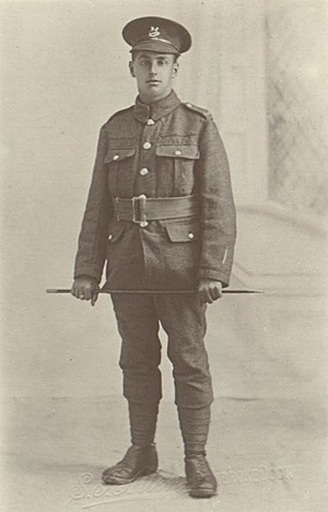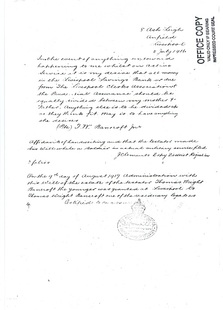Arras Memorial
Roll of Honour
A - B
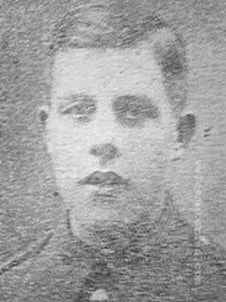
91150 Private
Harold Alderson
13th Bn. The King's (Liverpool Regiment)
22nd March 1918, aged 19.
Bay 3.
Son of Nathan and Ann Alderson, of 22, Sussex St., Burnley.
Harold Alderson
13th Bn. The King's (Liverpool Regiment)
22nd March 1918, aged 19.
Bay 3.
Son of Nathan and Ann Alderson, of 22, Sussex St., Burnley.
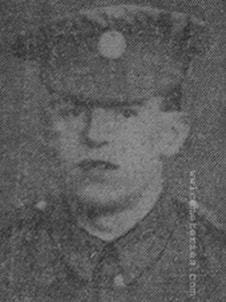
25220 Private
Austen Segar Aspden
11th Bn. East Lancashire Regiment
27th March 1918, age 25.
Addenda Panel
Son of Mrs E Aspden of 2, Vine St. Brierfield, Burnley.
Austen enlisted in 1916 and prior to that was employed at Brierfield Mills.
Austen Segar Aspden
11th Bn. East Lancashire Regiment
27th March 1918, age 25.
Addenda Panel
Son of Mrs E Aspden of 2, Vine St. Brierfield, Burnley.
Austen enlisted in 1916 and prior to that was employed at Brierfield Mills.
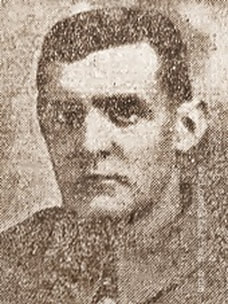
27408 Private
William Aspden
8th Bn. East Lancashire Regiment
21st May 1917.
Bay 6.
Lived at 297 Coal Clough Lane, Burnley.
William Aspden
8th Bn. East Lancashire Regiment
21st May 1917.
Bay 6.
Lived at 297 Coal Clough Lane, Burnley.
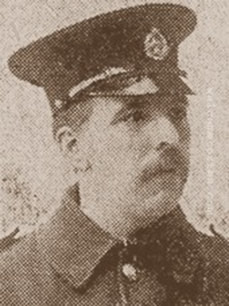
15913 Serjeant
James Atkinson
11th Bn. East Lancashire Regiment
27th June 1917, aged 36.
Bay 6.
Son of Mrs Atkinson, 46 Claret Street, Accrington.
An original member of the "Accrington Pals," having joined up in September 1914, Jim was an engineer by trade and was the third brother in the family to be killed.
His Captain, J. S. Duff wrote the following to Jim's mother;
"It is my sad part to write and tell you of your son's death. He was killed, poor chap, doing his 'job' by a high explosive shell and suffered no pain as he died instantly. He was in charge of the battalion dump before an attack which was a most successful one, and a lot was due to him in the way he had arranged everything for every company as they came to draw their stores. We shall miss him, as he was very popular during the time he was with us. He has done what many others have done before him during this war, and that is made the supreme sacrifice for the cause of Right."
James Atkinson
11th Bn. East Lancashire Regiment
27th June 1917, aged 36.
Bay 6.
Son of Mrs Atkinson, 46 Claret Street, Accrington.
An original member of the "Accrington Pals," having joined up in September 1914, Jim was an engineer by trade and was the third brother in the family to be killed.
His Captain, J. S. Duff wrote the following to Jim's mother;
"It is my sad part to write and tell you of your son's death. He was killed, poor chap, doing his 'job' by a high explosive shell and suffered no pain as he died instantly. He was in charge of the battalion dump before an attack which was a most successful one, and a lot was due to him in the way he had arranged everything for every company as they came to draw their stores. We shall miss him, as he was very popular during the time he was with us. He has done what many others have done before him during this war, and that is made the supreme sacrifice for the cause of Right."
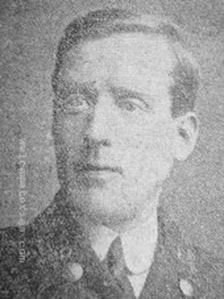
13365 Private
George Baldwin
11th Bn. East Lancashire Regiment
28th June 1917, aged 33.
Bay 6.
Son of Mary Baldwin, of 97, Parkinson St., Burnley, and the late James Baldwin.
George worked for the Burnley Tramways Company for thirteen years prior to enlisting in September 1914, he had been wounded three times.
Captain T. H. Heys wrote the following in a letter to George's sister, Mrs Shaw:
"Since he joined us a few months ago he has won everybody's affection and esteem as an able and cheerful soldier. He set a fine example of cheerful courage. He was killed by a shell as he was waiting for an attack, and he is buried near the place where he fell. A cross is erected on his grave."
George Baldwin
11th Bn. East Lancashire Regiment
28th June 1917, aged 33.
Bay 6.
Son of Mary Baldwin, of 97, Parkinson St., Burnley, and the late James Baldwin.
George worked for the Burnley Tramways Company for thirteen years prior to enlisting in September 1914, he had been wounded three times.
Captain T. H. Heys wrote the following in a letter to George's sister, Mrs Shaw:
"Since he joined us a few months ago he has won everybody's affection and esteem as an able and cheerful soldier. He set a fine example of cheerful courage. He was killed by a shell as he was waiting for an attack, and he is buried near the place where he fell. A cross is erected on his grave."
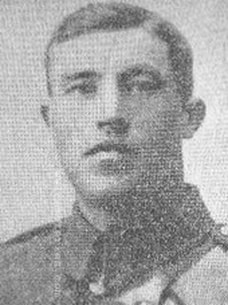
75623 Gunner
Dennis Bales
"X" 2nd T.M. Bty. Royal Field Artillery
11th June 1916, aged 27.
Bay 1.
Son of William and Elizabeth Cicely Bales, of Rotton Row, East Tuddenham, East Dereham, Norfolk.
Dennis Bales
"X" 2nd T.M. Bty. Royal Field Artillery
11th June 1916, aged 27.
Bay 1.
Son of William and Elizabeth Cicely Bales, of Rotton Row, East Tuddenham, East Dereham, Norfolk.
May is to have anything she desires.
The sad loss of my paternal Grandfather’s eldest son. He has no known grave but is remembered with honour at the Arras Memorial, in the Faubourg-d’Amiens Cemetery, Pas de Calais, France.
My Uncle Thomas Wright BANCROFT was born on the 30 September 1891 in Anfield, Liverpool. He was the 2nd child and eldest son of Thomas Wright Bancroft Snr. & Margaret Bancroft nee Ashcroft. He lived at 8 Ashleigh, Anfield, Liverpool with his parents & seven siblings. In the 1911 census Thomas Wright Bancroft is living at 8 Ashleigh, Anfield, Liverpool, the home of his father and mother, Thomas Wright Bancroft, Margaret and his brothers and sisters. He is 19 years of age and his occupation is a clerk with an African shipping agent. I have been unable to find records of his military service in WW1 through draft or enlistment as they must have been destroyed. In 1940 there was a World War Two bombing raid on the War Office in London where the records were held. During this raid, a large portion (approximately 60 percent) of the 6.5 million records was destroyed by fire. The surviving service records have become known as the 'Burnt Documents'. I do have a copy of his British Army WWI Medal Rolls Index Card, 1914-1920. The information recorded and found on the card include his Regiment and and Regimental Number. He was a private in the 13th Battalion Kings Liverpool Regiment. I do know that from information given to me by my father, (Leonard Ashcroft Bancroft, his youngest brother) that Thomas was wounded some time before he was killed in action. This can be confirmed by the wound stripe worn on his uniform in his photo c 1917. He had apparently been at home on leave and it was only two weeks after he had returned to the front that he was killed in action; blown to pieces by shell fire (the main cause of death for soldiers in the First World War) on the 13th June 1917 in Arras, Pas de Calais, France. He has no known grave but is remembered with honour at the Arras Memorial, in the Faubourg-d’Amiens Cemetery, Pas de Calais, France. I have a copy of Thomas W. Bancroft's Will dated 5th July 1916 and it includes the wish ……….. May (his Fiancée) is to have anything she desires.
An uncle I sadly never met, but is truly ‘not forgotten’ and I have had the honour to visit his War Memorial, in the Faubourg-d’Amiens Cemetery, Pas de Calais, France with my wife and our children to pay our respect for his sacrifice. His bothers, Samuel Herbert and Stephen who also saw active service, would return from this dreadful conflict relatively unscathed.
It was only last year that researching local newspaper archives I was able to confirm that Thomas was engaged to May through the death notices in the Liverpool Echo
Never forgotten. His name 'Liveth For Evermore'
Another of George's Uncles - Alfred Herbert Jardine - was killed in the Great War, you can see his story on the Chocques Military Cemetery page
Images and words courtesy of George Bancroft, his nephew, (My father, Leonard Ashcroft Bancroft, was one of his 4 brothers)
The sad loss of my paternal Grandfather’s eldest son. He has no known grave but is remembered with honour at the Arras Memorial, in the Faubourg-d’Amiens Cemetery, Pas de Calais, France.
My Uncle Thomas Wright BANCROFT was born on the 30 September 1891 in Anfield, Liverpool. He was the 2nd child and eldest son of Thomas Wright Bancroft Snr. & Margaret Bancroft nee Ashcroft. He lived at 8 Ashleigh, Anfield, Liverpool with his parents & seven siblings. In the 1911 census Thomas Wright Bancroft is living at 8 Ashleigh, Anfield, Liverpool, the home of his father and mother, Thomas Wright Bancroft, Margaret and his brothers and sisters. He is 19 years of age and his occupation is a clerk with an African shipping agent. I have been unable to find records of his military service in WW1 through draft or enlistment as they must have been destroyed. In 1940 there was a World War Two bombing raid on the War Office in London where the records were held. During this raid, a large portion (approximately 60 percent) of the 6.5 million records was destroyed by fire. The surviving service records have become known as the 'Burnt Documents'. I do have a copy of his British Army WWI Medal Rolls Index Card, 1914-1920. The information recorded and found on the card include his Regiment and and Regimental Number. He was a private in the 13th Battalion Kings Liverpool Regiment. I do know that from information given to me by my father, (Leonard Ashcroft Bancroft, his youngest brother) that Thomas was wounded some time before he was killed in action. This can be confirmed by the wound stripe worn on his uniform in his photo c 1917. He had apparently been at home on leave and it was only two weeks after he had returned to the front that he was killed in action; blown to pieces by shell fire (the main cause of death for soldiers in the First World War) on the 13th June 1917 in Arras, Pas de Calais, France. He has no known grave but is remembered with honour at the Arras Memorial, in the Faubourg-d’Amiens Cemetery, Pas de Calais, France. I have a copy of Thomas W. Bancroft's Will dated 5th July 1916 and it includes the wish ……….. May (his Fiancée) is to have anything she desires.
An uncle I sadly never met, but is truly ‘not forgotten’ and I have had the honour to visit his War Memorial, in the Faubourg-d’Amiens Cemetery, Pas de Calais, France with my wife and our children to pay our respect for his sacrifice. His bothers, Samuel Herbert and Stephen who also saw active service, would return from this dreadful conflict relatively unscathed.
It was only last year that researching local newspaper archives I was able to confirm that Thomas was engaged to May through the death notices in the Liverpool Echo
Never forgotten. His name 'Liveth For Evermore'
Another of George's Uncles - Alfred Herbert Jardine - was killed in the Great War, you can see his story on the Chocques Military Cemetery page
Images and words courtesy of George Bancroft, his nephew, (My father, Leonard Ashcroft Bancroft, was one of his 4 brothers)
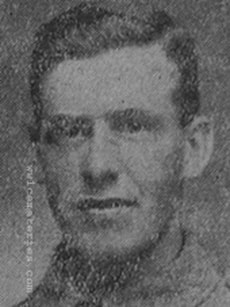
35559 Private
William Henry Barber
8th Bn. Border Regiment
23rd March 1918, aged 23.
Bay 6.
Son of Gerald A. and Mary Ellen Barber, of 10, Burnley Rd., Brownside, Burnley.
Willie joined up on March 27th, 1917. He was a Sunday School teacher at Worsthorne Wesleyan School and Chapel and also played for their cricket team. His father Gerald also served, with the Royal Engineers and survived.
William Henry Barber
8th Bn. Border Regiment
23rd March 1918, aged 23.
Bay 6.
Son of Gerald A. and Mary Ellen Barber, of 10, Burnley Rd., Brownside, Burnley.
Willie joined up on March 27th, 1917. He was a Sunday School teacher at Worsthorne Wesleyan School and Chapel and also played for their cricket team. His father Gerald also served, with the Royal Engineers and survived.
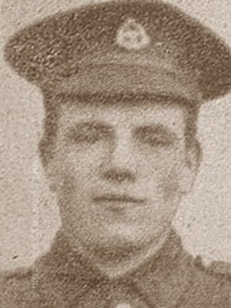
4695 Serjeant
Joseph Batty M. M. and Bar
2nd Bn. East Lancashire Regiment
17th February 1918, aged 28.
Addenda Panel
Husband of Mrs E. Batty, 8 Penny Street, Burnley
Prior to the war his was a collier at Bank Hall Pit.
Second Lieutenant H. E. Roberts wrote to Joseph's wife;
"I deeply regret to inform you of the death of your husband, Sergt. J. Batty, who was killed in action on February 16th. I don't know whether you have received news of his death, but I will try to describe what happened as I was not very far away when he was killed. On Saturday morning, February 16th, the Germans were bombarding our trenches, and about 11.30 a.m. one of the shells burst in the trench, killing your husband and wounding several others. I immediately rushed up to him, but arrived too late, as he must have been killed instantaneously. Your husband had been my platoon sergeant for over five months, and he was the best N.C.O. I ever had. He could be trusted to do anything, and always did it well. I had the greatest confidence in him, and he never failed me in anything. He was immensely popular with the N.C.O.'s and men of his platoon and a good sportsman, always willing to take part in our platoon football matches and games. I don't know how to express my sympathy and sorrow, but let me assure you of the deepest sympathy of the platoon and myself."
Joseph Batty M. M. and Bar
2nd Bn. East Lancashire Regiment
17th February 1918, aged 28.
Addenda Panel
Husband of Mrs E. Batty, 8 Penny Street, Burnley
Prior to the war his was a collier at Bank Hall Pit.
Second Lieutenant H. E. Roberts wrote to Joseph's wife;
"I deeply regret to inform you of the death of your husband, Sergt. J. Batty, who was killed in action on February 16th. I don't know whether you have received news of his death, but I will try to describe what happened as I was not very far away when he was killed. On Saturday morning, February 16th, the Germans were bombarding our trenches, and about 11.30 a.m. one of the shells burst in the trench, killing your husband and wounding several others. I immediately rushed up to him, but arrived too late, as he must have been killed instantaneously. Your husband had been my platoon sergeant for over five months, and he was the best N.C.O. I ever had. He could be trusted to do anything, and always did it well. I had the greatest confidence in him, and he never failed me in anything. He was immensely popular with the N.C.O.'s and men of his platoon and a good sportsman, always willing to take part in our platoon football matches and games. I don't know how to express my sympathy and sorrow, but let me assure you of the deepest sympathy of the platoon and myself."
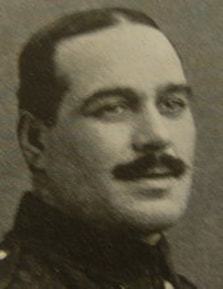
Lance Corporal
Edward John Beadle
2nd Bn. South Wales Borderers
23rd April 1917, aged 32.
Bay 6.
Son of Edward and Laura Beadle, of 104, Waddon New Rd., Croydon; husband of Lily Beadle, of 65, Clarendon Rd., Croydon, Surrey.
Edward John Beadle
2nd Bn. South Wales Borderers
23rd April 1917, aged 32.
Bay 6.
Son of Edward and Laura Beadle, of 104, Waddon New Rd., Croydon; husband of Lily Beadle, of 65, Clarendon Rd., Croydon, Surrey.
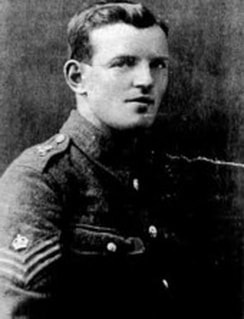
11038 Serjeant
Leslie Alexander Beaton
2nd Bn. Highland Light Infantry
28th April 1917.
Bay 8.
Leslie Alexander BEATON was born at Monkshill, Fyvie, Aberdeenshire, on 20 October 1890, and grew up in Musselburgh where he later attested for the 2nd Battalion/Highland Light Infantry. Leslie arrived with his regiment at Boulogne on 14 August 1914 (WO 372/2) and remained with the 2/HLI (First Army, Second Division, 5th Infantry Brigade), until his death. On leave in June 1915 following 2nd Ypres, Leslie married Mary Keppie MCNEILL at Musselburgh. His rank at the time of his marriage was Quartermaster Serjeant, and his widow's pension papers (PIN 82/10) relate that Leslie was a company Serjeant Major in "A" Company when he was killed at the age of 26 in the Battle of Arleux. Losses for the 2/HLI on 28 April 1917 totalled 42 officers and men killed, 187 wounded and 43 missing.
Picture courtesy of Ann Beaton
Leslie Alexander Beaton
2nd Bn. Highland Light Infantry
28th April 1917.
Bay 8.
Leslie Alexander BEATON was born at Monkshill, Fyvie, Aberdeenshire, on 20 October 1890, and grew up in Musselburgh where he later attested for the 2nd Battalion/Highland Light Infantry. Leslie arrived with his regiment at Boulogne on 14 August 1914 (WO 372/2) and remained with the 2/HLI (First Army, Second Division, 5th Infantry Brigade), until his death. On leave in June 1915 following 2nd Ypres, Leslie married Mary Keppie MCNEILL at Musselburgh. His rank at the time of his marriage was Quartermaster Serjeant, and his widow's pension papers (PIN 82/10) relate that Leslie was a company Serjeant Major in "A" Company when he was killed at the age of 26 in the Battle of Arleux. Losses for the 2/HLI on 28 April 1917 totalled 42 officers and men killed, 187 wounded and 43 missing.
Picture courtesy of Ann Beaton
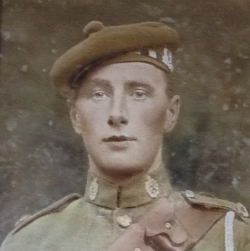
292733 Private
William Bell
1/7th Bn. Black Watch (Royal Highlanders)
23rd April 1917.
Bay 6.
Born 28th March 1885. First born son to William and Agnes, farmers, Langraw Farm, Bonchester Bridge, Hawick, Scottish Borders. He lives on through others.
Image courtesy of Marian Bell (Great Niece)
William Bell
1/7th Bn. Black Watch (Royal Highlanders)
23rd April 1917.
Bay 6.
Born 28th March 1885. First born son to William and Agnes, farmers, Langraw Farm, Bonchester Bridge, Hawick, Scottish Borders. He lives on through others.
Image courtesy of Marian Bell (Great Niece)
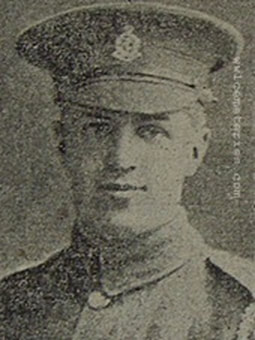
352597 Private
William Bell
1st/2nd East Lancs Field Ambulance, Royal Army Medical Corps.
28th March 1918, aged 22.
Bay 10.
Son of Richard and Elizabeth Bell, of 83, Laithe St., Burnley, Lancs.
Prior to enlisting he had worked as a weaver at Messrs. Maxfield's Shed, Burnley. He was killed when he and another man were carrying a wounded comrade on a stretcher and a shell fell close by, killing all three.
His parents received the following letter from Lieut-Col. A. Callam;
"Please accept my deepest sympathy and that of my officers and men in the sad loss sustained by the death of your son, Pte. W. Bell, killed in action while doing his duty. Although not belonging to my unit, he was serving with me at the time of his death. He was a keen and gallant soldier, and we all feel his loss very keenly."
Another letter from Captain W. J. Purves read;
"Your son was most popular with the men. He was always so bright and willing. He was killed along with another Burnley boy when carrying the wounded. On the evening when word arrived that your boy had been killed all were quiet and sad. The boys felt it very much."
William Bell
1st/2nd East Lancs Field Ambulance, Royal Army Medical Corps.
28th March 1918, aged 22.
Bay 10.
Son of Richard and Elizabeth Bell, of 83, Laithe St., Burnley, Lancs.
Prior to enlisting he had worked as a weaver at Messrs. Maxfield's Shed, Burnley. He was killed when he and another man were carrying a wounded comrade on a stretcher and a shell fell close by, killing all three.
His parents received the following letter from Lieut-Col. A. Callam;
"Please accept my deepest sympathy and that of my officers and men in the sad loss sustained by the death of your son, Pte. W. Bell, killed in action while doing his duty. Although not belonging to my unit, he was serving with me at the time of his death. He was a keen and gallant soldier, and we all feel his loss very keenly."
Another letter from Captain W. J. Purves read;
"Your son was most popular with the men. He was always so bright and willing. He was killed along with another Burnley boy when carrying the wounded. On the evening when word arrived that your boy had been killed all were quiet and sad. The boys felt it very much."
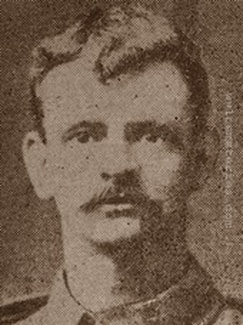
18729 Private
Alfred Blades
8th Bn. East Lancashire Regiment
11th April 1917, aged 41.
Bay 6.
Son of Mrs. Mary Jane Blades; husband of Martha Blades, of 1, Marriott St., Brierfield, Burnley. Served in the South African Campaign.
A letter from an officer told his parents that he had gone "over the top" after a very heavy bombardment on 11th April and had not been seen or heard of subsequently. Alfred held the South African medal, with 5 clasps and rejoined the colours in 1915. Prior to enlisting he had been a Slater working for Messrs. Barnes and Oates Slaters, he was a member of the Palatine club in nearby Nelson.
Alfred Blades
8th Bn. East Lancashire Regiment
11th April 1917, aged 41.
Bay 6.
Son of Mrs. Mary Jane Blades; husband of Martha Blades, of 1, Marriott St., Brierfield, Burnley. Served in the South African Campaign.
A letter from an officer told his parents that he had gone "over the top" after a very heavy bombardment on 11th April and had not been seen or heard of subsequently. Alfred held the South African medal, with 5 clasps and rejoined the colours in 1915. Prior to enlisting he had been a Slater working for Messrs. Barnes and Oates Slaters, he was a member of the Palatine club in nearby Nelson.
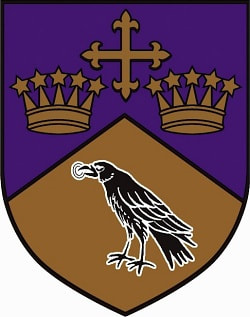
15782 Private
Basil Blakeman
7th/8th Bn. King's Own Scottish Borderers
9th April 1917.
Bay 6.
The information below supplied by 'The Ellesmerian Club', the alumni organisation for Ellesmere College where Basil was a pupil.
Basil Stocker Blakeman was born on 4th May 1881 in Manchester to William, an accountant’s clerk, and his wife, Elizabeth just weeks after the 1881 Census. Sadly, when he was just four years old, his mother died. By the time of the next census in April 1891 he was recorded as living with his uncle at Fern Bank, South Grove, Brooklands, Cheshire. He attended Brooklands School for the three years prior to his admittance to Ellesmere College on his twelfth birthday. Most boys only attend the college for a year or so but Basil boarded in the ‘Gordon’ dormitory for four years.
When he arrived at Ellesmere he was placed in Form Lower II under the instruction of Mr. R. Owen. There were one hundred and seventy-four boys on the nominal roll. Nothing is known of any academic achievements during those four years and there are only a few mentions of his sporting prowess in The Ellesmerian. During the 1893 Rugby season he played forward for his dormitory team and in the 1894 season he played in the match against the ‘Alfred’ dormitory on 3rd December. The match report recorded that “Blakeman conspicuous for very plucky play…….ought to be exceedingly useful when he has grown a little more”. The sport he excelled at was cricket although he never made the 1st XI team. The summary of his performance in the 2nd XI team at the end of the 1986 season said that he was a “promising bat; plays forward well; must be careful to keep in his ground. In bowling has a good action, is straight and keeps good length, but must not try to bowl fast”.
Basil left Ellesmere in April 1897. A year later he was back at the college and played rugby for the Old Ellesmerian Club team. A convivial dinner was held later in the day but this seems to be the last contact that he ever had with the college or the Club.
By the time of the 1901 Census Basil was 19 years old, single and employed as a warehouseman in north Manchester. It would appear though that the appeal of this way of life faded as on 27th May 1904, in Manchester, he signed a set of Attestation Papers to enlist in the British army. On these documents he stated that he was 23 years old, employed as a warehouseman having completed a five years’ apprenticeship with Messrs. Phillips (which he had completed in 1902) and that he had no previous military experience.
The very next day he was embodied at Ashton under Lyne as Private Blakeman, Service No: 9974 in the Manchester Regiment at their depot. On 17th June he was transferred to 2nd Battalion. On 18th February 1905 he was transferred again, this time to the 1st Battalion and it was with this unit that he embarked for service overseas in India, where he remained until he was discharged at his own request on 12th June 1908. He was awarded a Good Conduct badge on 23rd January 1907.
His discharge cost him £37.00 – a huge sum of money in those days and probably only possible because his father had died the previous June and left him the sum of £587. His discharge documents record that his address on discharge would be Green Mount, Queen’s Park, Manchester.
By the time of the 1911 Census he had returned to his old trade of warehouseman. He was 29 years old, single and boarded at Grosvenor Street, Manchester.
When war was declared, Basil would have been 33 years old. It was on 23rd June 1915 that he re-enlisted and became Private Blakeman, Service No: 15782 in the 7th Battalion, the King’s Own Scottish Borderers. He was refunded £9 of his original purchase money.
Exactly where Basil saw active service is not recorded but the battalion mobilised for war and landed in Boulogne on 10th July 1915. In 1915 they fought at the Battle of Loos and 1916 saw them in action at the Battles of Pozieres, Flers-Courcelette and Transloy until they amalgamated with the 8th Battalion to form the 7/8th Battalion. Part of 15th Division. In 1917 the unit as present at the First and Second Battles of the Scarpe, the Battle of Pilkem and the Battle of Langemark.
On 6th April the battalion moved by platoon at 75 yard intervals to cellars in Grande Place, Arras by way of Louez & St. Catherine, prior to their next operation. The weather had broken and the battalion had “a very bad march”. They remained in the cellars the next day, sitting out bombardments. By 8th April, Easter Sunday, the weather had broken and was warm and sunny with a mild, westerly wind.
The Battalion War Diary records that on 9th April, the day Basil died, “in accordance with orders to attack hostile trenches east of Arras” the battalion “at 6am from cellars on Grande Place entered the sewer and at 7 am entered Bovet Trench to move up via Iron Street- Income Tax via Blangy to position of assembly in rear of Freds Wood.
Exactly how or when Basil died that day is not known. Casualties were estimated at five Officers and one hundred Other Ranks. Basil’s sacrifice is commemorated on the Arras Memorial (Bay 6). For his wartime service he was awarded the Victory Medal, the British War Medal and the 1914-1915 Star.
Basil Blakeman
7th/8th Bn. King's Own Scottish Borderers
9th April 1917.
Bay 6.
The information below supplied by 'The Ellesmerian Club', the alumni organisation for Ellesmere College where Basil was a pupil.
Basil Stocker Blakeman was born on 4th May 1881 in Manchester to William, an accountant’s clerk, and his wife, Elizabeth just weeks after the 1881 Census. Sadly, when he was just four years old, his mother died. By the time of the next census in April 1891 he was recorded as living with his uncle at Fern Bank, South Grove, Brooklands, Cheshire. He attended Brooklands School for the three years prior to his admittance to Ellesmere College on his twelfth birthday. Most boys only attend the college for a year or so but Basil boarded in the ‘Gordon’ dormitory for four years.
When he arrived at Ellesmere he was placed in Form Lower II under the instruction of Mr. R. Owen. There were one hundred and seventy-four boys on the nominal roll. Nothing is known of any academic achievements during those four years and there are only a few mentions of his sporting prowess in The Ellesmerian. During the 1893 Rugby season he played forward for his dormitory team and in the 1894 season he played in the match against the ‘Alfred’ dormitory on 3rd December. The match report recorded that “Blakeman conspicuous for very plucky play…….ought to be exceedingly useful when he has grown a little more”. The sport he excelled at was cricket although he never made the 1st XI team. The summary of his performance in the 2nd XI team at the end of the 1986 season said that he was a “promising bat; plays forward well; must be careful to keep in his ground. In bowling has a good action, is straight and keeps good length, but must not try to bowl fast”.
Basil left Ellesmere in April 1897. A year later he was back at the college and played rugby for the Old Ellesmerian Club team. A convivial dinner was held later in the day but this seems to be the last contact that he ever had with the college or the Club.
By the time of the 1901 Census Basil was 19 years old, single and employed as a warehouseman in north Manchester. It would appear though that the appeal of this way of life faded as on 27th May 1904, in Manchester, he signed a set of Attestation Papers to enlist in the British army. On these documents he stated that he was 23 years old, employed as a warehouseman having completed a five years’ apprenticeship with Messrs. Phillips (which he had completed in 1902) and that he had no previous military experience.
The very next day he was embodied at Ashton under Lyne as Private Blakeman, Service No: 9974 in the Manchester Regiment at their depot. On 17th June he was transferred to 2nd Battalion. On 18th February 1905 he was transferred again, this time to the 1st Battalion and it was with this unit that he embarked for service overseas in India, where he remained until he was discharged at his own request on 12th June 1908. He was awarded a Good Conduct badge on 23rd January 1907.
His discharge cost him £37.00 – a huge sum of money in those days and probably only possible because his father had died the previous June and left him the sum of £587. His discharge documents record that his address on discharge would be Green Mount, Queen’s Park, Manchester.
By the time of the 1911 Census he had returned to his old trade of warehouseman. He was 29 years old, single and boarded at Grosvenor Street, Manchester.
When war was declared, Basil would have been 33 years old. It was on 23rd June 1915 that he re-enlisted and became Private Blakeman, Service No: 15782 in the 7th Battalion, the King’s Own Scottish Borderers. He was refunded £9 of his original purchase money.
Exactly where Basil saw active service is not recorded but the battalion mobilised for war and landed in Boulogne on 10th July 1915. In 1915 they fought at the Battle of Loos and 1916 saw them in action at the Battles of Pozieres, Flers-Courcelette and Transloy until they amalgamated with the 8th Battalion to form the 7/8th Battalion. Part of 15th Division. In 1917 the unit as present at the First and Second Battles of the Scarpe, the Battle of Pilkem and the Battle of Langemark.
On 6th April the battalion moved by platoon at 75 yard intervals to cellars in Grande Place, Arras by way of Louez & St. Catherine, prior to their next operation. The weather had broken and the battalion had “a very bad march”. They remained in the cellars the next day, sitting out bombardments. By 8th April, Easter Sunday, the weather had broken and was warm and sunny with a mild, westerly wind.
The Battalion War Diary records that on 9th April, the day Basil died, “in accordance with orders to attack hostile trenches east of Arras” the battalion “at 6am from cellars on Grande Place entered the sewer and at 7 am entered Bovet Trench to move up via Iron Street- Income Tax via Blangy to position of assembly in rear of Freds Wood.
Exactly how or when Basil died that day is not known. Casualties were estimated at five Officers and one hundred Other Ranks. Basil’s sacrifice is commemorated on the Arras Memorial (Bay 6). For his wartime service he was awarded the Victory Medal, the British War Medal and the 1914-1915 Star.
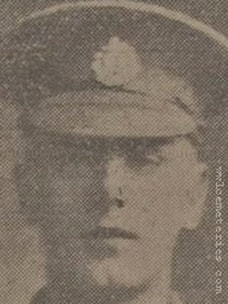
16260 Private
Percy Frederick Blandamer
6th Bn. Dorsetshire Regiment
14th May 1917, aged 21.
Bay 6.
Son of Mrs. Elizabeth Blandamer, of 18, Dagmar Rd., Dorchester, Dorset.
Percy Frederick Blandamer
6th Bn. Dorsetshire Regiment
14th May 1917, aged 21.
Bay 6.
Son of Mrs. Elizabeth Blandamer, of 18, Dagmar Rd., Dorchester, Dorset.
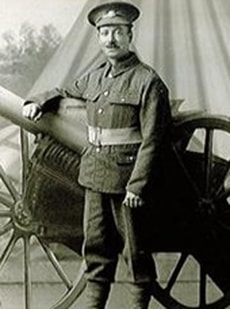
17946 Private
Charles Alexander Bory
1st Bn. East Surrey Regiment
8th May 1917.
Bay 6.
Born in London, 1885. Father to Ivy & Gladys Bory. My Grandmother was Ivy Bory
Picture courtesy of Ian Ellmers
Charles Alexander Bory
1st Bn. East Surrey Regiment
8th May 1917.
Bay 6.
Born in London, 1885. Father to Ivy & Gladys Bory. My Grandmother was Ivy Bory
Picture courtesy of Ian Ellmers
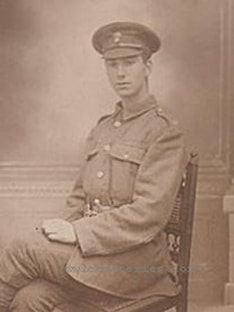
63610 Private
Frederick William Bowen
13th Bn. Royal Fusiliers
11th April 1917, aged 19.
Bay 3.
Son of Frederick and Susannah Bowen, of 3, Fearnley Rd., Camberwell, London.
He was born on 30th December 1897 at Camberwell, south London, the 4th out of of 5 children born to Frederick and Susanna Bowen (nee Carpenter), and the only boy. They lived at 3 Fernley Road, Camberwell. His older sister Susannah was my Grandmother. She and her sisters Lillian, Ethel and Margaret lived to old age.
Picture courtesy of great nephew, Richard Cross.
Frederick William Bowen
13th Bn. Royal Fusiliers
11th April 1917, aged 19.
Bay 3.
Son of Frederick and Susannah Bowen, of 3, Fearnley Rd., Camberwell, London.
He was born on 30th December 1897 at Camberwell, south London, the 4th out of of 5 children born to Frederick and Susanna Bowen (nee Carpenter), and the only boy. They lived at 3 Fernley Road, Camberwell. His older sister Susannah was my Grandmother. She and her sisters Lillian, Ethel and Margaret lived to old age.
Picture courtesy of great nephew, Richard Cross.
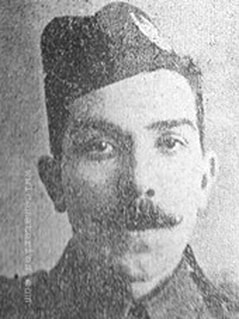
16892 Lance Corporal
James Bridge
10th Bn. Cameronians (Scottish Rifles)
26th April 1917.
Bay 6.
Lived at 20 Bush Street, Burnley, Lancashire.
His widow received the following letter from Captain D. A. Foulds:
"It is with great regret that I write to advise you of the death of your husband. It may be some small consolation to know that he died a hero's death, working his gun to the last, till shot in the head by an enemy sniper. His death was instantaneous, so he did not suffer. He was buried where he was killed, in a place which will be advised to you later. I knew your husband very well, as he had been in my company for a long time, and I can assure you that no braver man and stauncher friend could be found in his company. Everyone here mourns his death, and we all send you are sincere sympathy in your terrible loss."
Sergt. H. Ashworth wrote;
"I write to tell you the worst has happened, James was killed on Tuesday, the 24th, while in the thick of the fighting. God only knows what a blow it is to you, but do try and keep up for the baby's sake. It may console you a little to know that he died without suffering, being killed instantly. It is hard enough for us to bear. He was such a good chum and highly respected by all who knew him. I think if ever a man did his share in this war it was Jimmy, he made the supreme sacrifice in one of the greatest battles in the war."
James Bridge
10th Bn. Cameronians (Scottish Rifles)
26th April 1917.
Bay 6.
Lived at 20 Bush Street, Burnley, Lancashire.
His widow received the following letter from Captain D. A. Foulds:
"It is with great regret that I write to advise you of the death of your husband. It may be some small consolation to know that he died a hero's death, working his gun to the last, till shot in the head by an enemy sniper. His death was instantaneous, so he did not suffer. He was buried where he was killed, in a place which will be advised to you later. I knew your husband very well, as he had been in my company for a long time, and I can assure you that no braver man and stauncher friend could be found in his company. Everyone here mourns his death, and we all send you are sincere sympathy in your terrible loss."
Sergt. H. Ashworth wrote;
"I write to tell you the worst has happened, James was killed on Tuesday, the 24th, while in the thick of the fighting. God only knows what a blow it is to you, but do try and keep up for the baby's sake. It may console you a little to know that he died without suffering, being killed instantly. It is hard enough for us to bear. He was such a good chum and highly respected by all who knew him. I think if ever a man did his share in this war it was Jimmy, he made the supreme sacrifice in one of the greatest battles in the war."
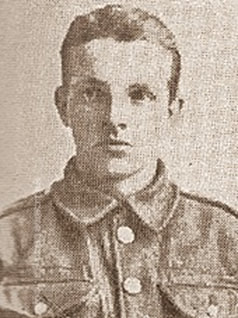
202554 Private
Clarence Atkins Brown
1st/5th Bn. East Lancashire Regiment
3rd April 1918, aged 21.
Bay 6.
Son of Mr and Mrs J. Brown of 11 Sagar Fold, Colne, Lancashire.
Prior to enlisting he was an apprentice painter with Messrs. Hartley Bros.
Clarence Atkins Brown
1st/5th Bn. East Lancashire Regiment
3rd April 1918, aged 21.
Bay 6.
Son of Mr and Mrs J. Brown of 11 Sagar Fold, Colne, Lancashire.
Prior to enlisting he was an apprentice painter with Messrs. Hartley Bros.
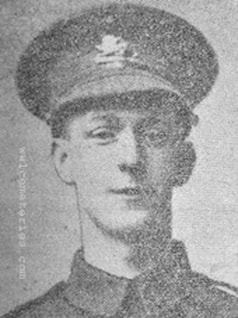
241968 Private
James Henry Brown
8th Bn. King's Own (Royal Lancaster Regiment)
26th April 1917, aged 28.
Bay 2.
Son of Mr & Mrs Brown, 46 Baron Terrace, Healey Wood, Burnley.
James was a widower and worked as a Billposter for the Burnley Tradesmen's Billposting Company.
Originally reported missing in April 1917 and ten months later he was presumed killed.
James Henry Brown
8th Bn. King's Own (Royal Lancaster Regiment)
26th April 1917, aged 28.
Bay 2.
Son of Mr & Mrs Brown, 46 Baron Terrace, Healey Wood, Burnley.
James was a widower and worked as a Billposter for the Burnley Tradesmen's Billposting Company.
Originally reported missing in April 1917 and ten months later he was presumed killed.
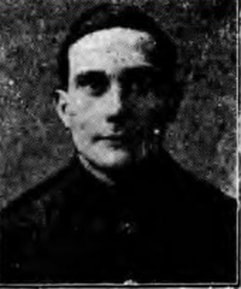
292601 Lance Corporal
Robert Brown
1st Bn. Northumberland Fusiliers
24th March 1918, aged 37.
Bay 2 & 3.
Husband of Alice Maud Dash (formerly Brown), of 2, Broad St., Cambridge.
Robert Brown
1st Bn. Northumberland Fusiliers
24th March 1918, aged 37.
Bay 2 & 3.
Husband of Alice Maud Dash (formerly Brown), of 2, Broad St., Cambridge.
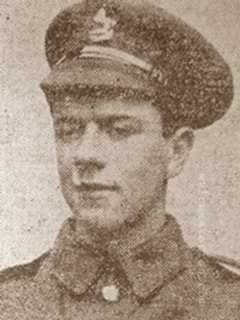
9117 Private
Albert Buckingham
13th Bn. The King's (Liverpool Regiment)
28th March 1918, aged 19.
Bay 3.
Son of Mrs. E. A. Buckingham, of 2, Colville St., Burnley, Lancs.
Albert was officially listed as "killed" in June 1919, over 12 months after he was first reported missing.
He attended Colne-Road Wesleyan School and was a weaver at Messrs. Spencer's Queen's Mill, he joined up aged 18 and had been at the front for 13 months at the time of his death.
Albert Buckingham
13th Bn. The King's (Liverpool Regiment)
28th March 1918, aged 19.
Bay 3.
Son of Mrs. E. A. Buckingham, of 2, Colville St., Burnley, Lancs.
Albert was officially listed as "killed" in June 1919, over 12 months after he was first reported missing.
He attended Colne-Road Wesleyan School and was a weaver at Messrs. Spencer's Queen's Mill, he joined up aged 18 and had been at the front for 13 months at the time of his death.
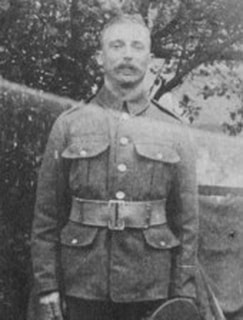
G/22994 Private
Henry John Burgess
11th Bn. Middlesex Regiment
12th May 1917, aged 34.
Bay 7.
Husband of Mary Ann Clegg (formerly Burgess), of 27, Andover Rd., Hornsey Rd., Holloway
Henry John Burgess
11th Bn. Middlesex Regiment
12th May 1917, aged 34.
Bay 7.
Husband of Mary Ann Clegg (formerly Burgess), of 27, Andover Rd., Hornsey Rd., Holloway
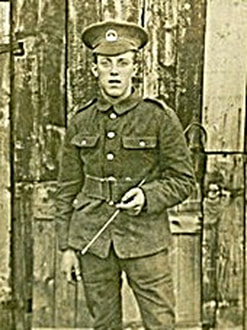
19749 Lance Corporal
William Burrows
2nd Bn. South Wales Borderers
14th April 1917, aged 23.
Bay 6.
Son of Peter Burrows and Mary Ann Burrows, nee Rowlands of The Square, Buckley, Flintshire, North Wales.
Picture courtesy of great nephew, Phil Davies
William Burrows
2nd Bn. South Wales Borderers
14th April 1917, aged 23.
Bay 6.
Son of Peter Burrows and Mary Ann Burrows, nee Rowlands of The Square, Buckley, Flintshire, North Wales.
Picture courtesy of great nephew, Phil Davies
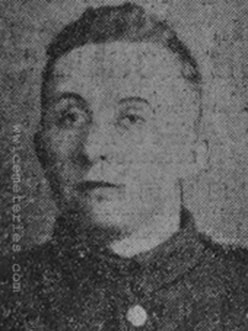
24272 Private
Jordan Butterworth
11th Bn. East Lancashire Regiment
27th March 1918, aged 25.
Bay 6.
Son of Sarah Agnes Butterworth, of 57, Ebor St., Burnley, and the late Lord Butterworth.
Prior to enlisting in November 1915, he worked as a gardener at Mrs Haslam's late of Oak Lea, Burnley.
Jordan Butterworth
11th Bn. East Lancashire Regiment
27th March 1918, aged 25.
Bay 6.
Son of Sarah Agnes Butterworth, of 57, Ebor St., Burnley, and the late Lord Butterworth.
Prior to enlisting in November 1915, he worked as a gardener at Mrs Haslam's late of Oak Lea, Burnley.
Dedications
4982 Lance Serjeant Edward Akehurst, 1st Bn., Rifle Brigade, 9th April1917 aged 24. Son of Charles and Alma Akehurst, of 40, Newmarket Rd., Lewes Rd., Brighton.
Remembered by Jim Type
251062 Private Alexander Balgowan, 2nd Bn. Royal Scots, 3rd May 1917, aged 36. Foster son of Mr. and Mrs. George Balgowan, of 37, Regent St., Fife-Keith, Banffshire.
Remembered with great pride your loving family of all Balgowan's in Keith.
4982 Lance Serjeant Edward Akehurst, 1st Bn., Rifle Brigade, 9th April1917 aged 24. Son of Charles and Alma Akehurst, of 40, Newmarket Rd., Lewes Rd., Brighton.
Remembered by Jim Type
251062 Private Alexander Balgowan, 2nd Bn. Royal Scots, 3rd May 1917, aged 36. Foster son of Mr. and Mrs. George Balgowan, of 37, Regent St., Fife-Keith, Banffshire.
Remembered with great pride your loving family of all Balgowan's in Keith.

